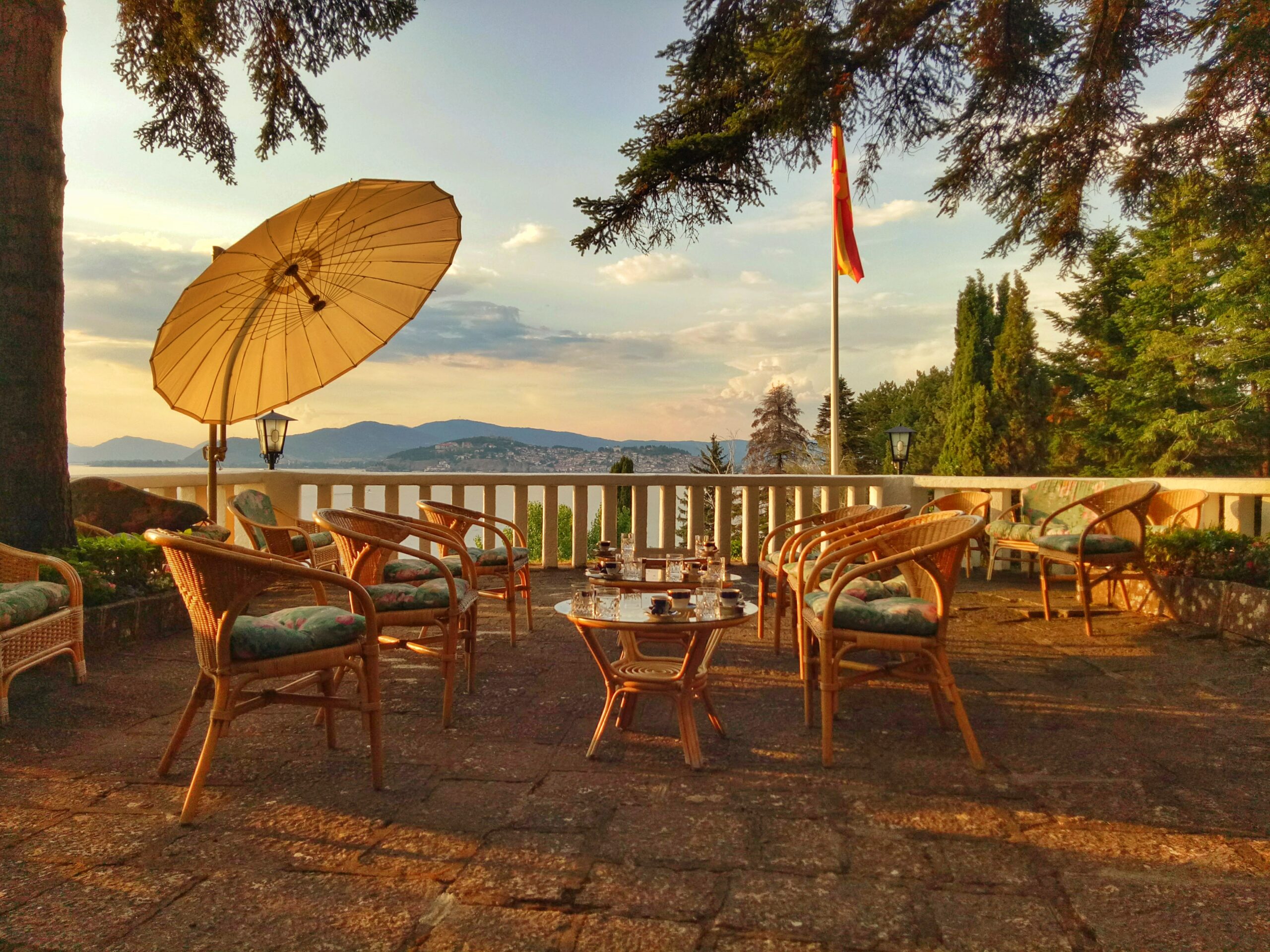View from Presidential Villa Biljana overlooking Lake Ohrid. Photo credit: James Cvetkovski
By James Cvetkovski, Birthright Macedonia Class of 2017
For as long as I can remember, my ties to Macedonia were delivered through the lens of my father’s fond tales of what was a then-Yugoslavian Macedonia. He would gleefully share his passions for the country with me and my siblings while we sat and nodded. Most of it glossed over me (sorry, Dad). Countless historical wafflings of a place and people entirely unfamiliar to me, a young Australian. I am a product of a country in its infancy struggling to find a cultural voice of its own, instead borrowing, adapting, fusing and confusing the cultures of its many diverse incomers. To me, the westernised Australia has always had its identity crisis. Having backpacked through many European countries amid my twenties—a rite of passage for many young Australians—I looked at its diversity with awe, ambling through cobbled streets thick with the hanging presence of history. I couldn’t help but notice how I never had that feeling back at home. I met swathes of travelers fantasising about visiting Down Under, itching to see its beaches, wildlife and scorched outback deserts. Having lived all of my life in the metropolitan suburbs of Melbourne, I had seen just about as much of the ‘wild’ Australia as they had; I may as well have grown up in New York City. To those who are yet to make the voyage, Melbourne is almost another American city. Deserts, kangaroos and surf are instead exchanged for skyscrapers, Dachshunds and brunch. Our modern identity seesaws between customs left from our Monarchist roots and the injection of American culture through mainstream media. We wear a different hat depending on who is in the room with us. I am commonly countered with “Ah, but what about your Indigenous history?” All I will say is that it is staggering how little colonised Australia has integrated pre-settlement history into its culture. To that end, sadly, I cannot identify with Indigenous Australia either. Which leaves us with the history from our immigrants; my family’s history. Australia received an influx of Europeans from the end of World War II up until the early 1970s, particularly from the Mediterranean and Balkan regions, searching for prosperity. My father’s family came to Australia in the 1960s and settled into a new life. For a lot of immigrants at that time, they had a hard time integrating into post-colonial Australia. I am a second-generation Macedonian, born and raised in urban Australia. I didn’t understand much of the Macedonian customs, history, politics or even the language growing up. To me, being Macedonian meant having a long and confusing surname that just about nobody could pronounce. I had visited Macedonia as a nine-year-old, and again in my early twenties, but neither of those times were truly as an independent, curious adult. It was not until I visited last year and participated in the Birthright Macedonia program that I finally began seeing the glowing potential of Macedonia.
The first time I saw it was during my three-week internship. My placement was at the St. Cyril and Methodius University Department of Pharmacology located at the Mother Teresa State Hospital in Skopje. This was perfectly aligned with my skillset having completed an undergraduate degree in Biomedical Science majoring in Medical Genetics. I had experience using a lot of cutting-edge technology in Australia in the growing field of diagnostic genetics. Walking into Dr. Dimovski’s laboratory in Skopje, I was floored to see they were doing next-generation DNA sequencing—an exciting emergent technology in the field of genetics. I never expected to see the same sort of work I was doing in Australia being translated halfway across the world in a small Macedonian lab. I could pick up almost exactly where I left off. My colleagues were extremely accommodating and took time to get to know me. We hung out outside of work and I got to learn more about the country the way the locals see it.
In our Birthright cohort, we had a tight-knit group of eight participants. We spent a lot of time together after work exploring the Macedonian nightlife. I have done a lot of backpacking around Europe, and I tell you what, if you want a cheap night out in a picturesque European city, you would be mad not to pay Skopje a visit. Between our own explorations and the excursions put on by the Birthright team, we really got stuck into what Macedonia has to offer: the sights of the newly-built architecture in Skopje’s Centar easily rivals that of Vienna; the way the afternoon sun hits the walls of Matka Canyon, you could have convinced me I was back at Yellowstone National Park; the drive into Galičnik struck me with the same awe that Glencoe in the Scottish Highlands did; and quite frankly, the epic sunset of Lake Ohrid was like nothing I’d seen before. We packed a lot into three weeks. The excursions and events alone made it a worthwhile trip, but the whole package together really gave me a sense of what this country is about.
After Birthright finished, I was fortunate enough to be selected to participate in the eighth generation of the President Ivanov School of Young Leaders. Lodged in the 5-star Hotel Inex Gorica overlooking the stunning Lake Ohrid, our group of 40 bright, young people spent 10 days learning from some of the world’s top minds on their take of what it means to be a leader. We heard from entrepreneurs, multinational executives, academics from Norway, Switzerland and USA, an ex-military leader, a leading Doctor of Genetics, and swathes of others with equally impressive credentials. It was hard work—and there was work to do—but the reward was immense. It being the school of the President, he himself played an active role with the group, spending time with us and listening to our ideas for how we can help Macedonia grow stronger. He even sat with us to watch an FK Vardar football match, and joined us at a kafana on the last night of the program dancing oro until we couldn’t stand anymore. This program astounded me with how forward-thinking it was, placing a lot of emphasis on how young people will be the engines of change in the world. Much like Birthright, though, where there was work, there was play. We went out, we boogied and we bonded. We have all kept in touch and I still connect with my buddy from the program on a regular basis.
It has not been until my time spent in the Birthright Macedonia program that I have realised the depth of my own lack of cultural identity. I had never mixed in with the Macedonian diaspora or felt I was part of a community. Neither did I particularly resonate with the Australian way of life. During my visit as a 26-year-old, I saw how accepting and hospitable Macedonians were and quickly felt a sense of belonging. The way of life to a Macedonian is very different to what I was used to in Australia. The average urban Australian works beyond full-time hours to meet their mortgage repayments, or to keep up with soaring rental prices and whatever other mod cons they come with. It was in Macedonia that it was explained to me their way of life: “Some countries live to work; here in Macedonia, we work to live.” a colleague once told me. Your friends are only a phone call away from sitting down for a Skopsko in the park later that evening to stave off the summer swell. In Australia, you don’t call; you send a text or a DM to your friends to maybe think about setting a time next week which one of you will probably flake out on anyway. In Macedonia, you see your friends, and you will always have friends to see. I found myself settling into these social routines easily.
I have done my best to travel as wide and as often as I can over the past few years to continually recontextualise who I am in this world and what I can give to it. The central tenet I have taken from this is humility: to understand that I do not have all of the answers and to be aware of the fluidity of my paradigms. I have learnt that people are the most powerful resource we have on this planet. I came into this program skeptical, but have been floored by the Macedonians’ resourcefulness, connection with others and genuine interest to help those around them with no expectation of any return. These people have provided a connection I wasn’t fully aware I wanted. I am thrilled to have found a culture that lives the same values I have discovered through travel, and one that is so willing to accept me into its fold—what’s more, I’m already a member! I am hungry to uncover a deeper understanding of my roots and to connect together with a whole new community of people. I could not be more appreciative of the opportunities this program has presented to me. This trip was indeed a very special trip.
Click HERE to learn more and apply for Birthright Macedonia.

